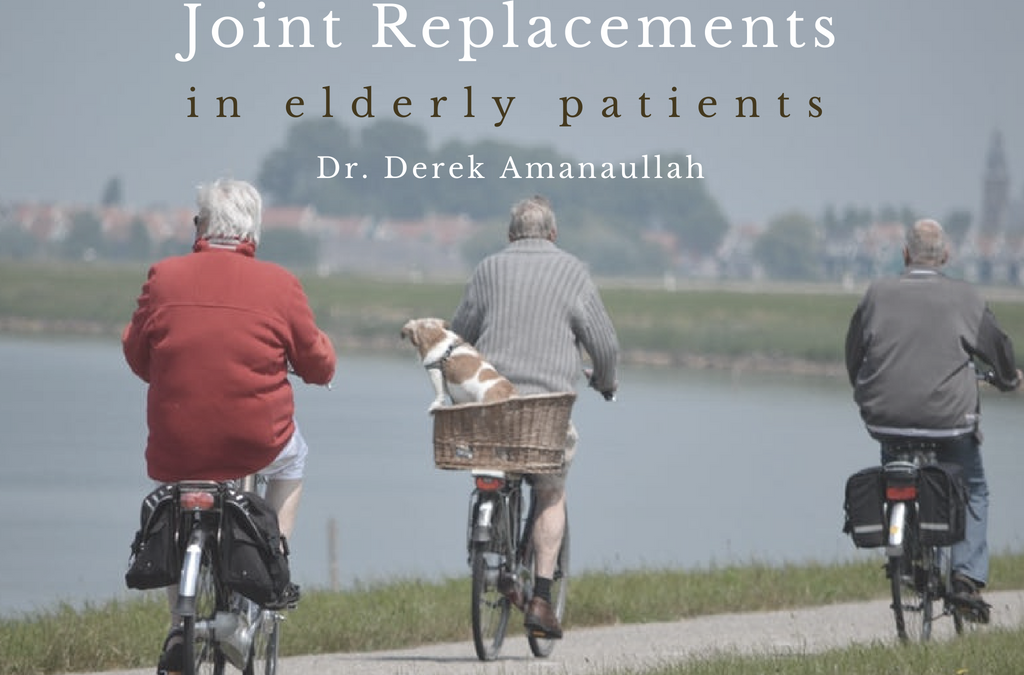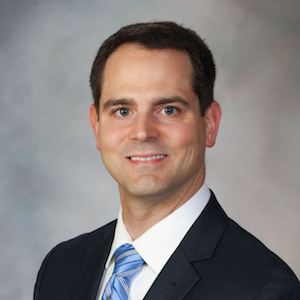Interviewer:
Hello Dr. Amanatullah! How are you?
Dr. Derek Amanatullah:
I am doing great
Interviewer:
Thank you for coming on again! Let’s talk a little bit about joint replacement on the elderly community. First of all and this might sound silly but cool counts as elderly when you account for how you’re going to do the procedure and other things to take into effect?
Dr. Derek Amanatullah:
It’s actually a really good question. I think in general people think of elderly patients as people over seventy-five, but for me, it’s very different. I wouldn’t necessarily judge patients by their age-old wall in.
There’s good data and the orthopedic literature that patients over about the age of eighty to carry slightly higher risk. But I can say from looking at my patients, and overall that if I had a forty-five-year-old read many many medical comorbidities meaning say, blood clots or blue pants or a bunch of issues that are going on you might find them physiologically healthier less healthy than that healthy eighty or ninety-year-old.
So for me, I think less about chronological age and think more about a patient’s physiologic age and it’s really the medical issues related to those patients that drives whether they’re a good bad or indifferent candidate for total trying replacement because it controls the risks of the complications they might have.
It just so happens that a lot of medical comorbidities come when we’re older so those things could be related but I would say they’re not related in every single case and I would caution people from thinking just about chronological age.
Interviewer:
When you go in to do a joint replacement on someone with a high physiologic age whether that’s as a result of their actual age or some other comorbidities you’re talking about, what are some of the additional factors you have to take into account when you actually go in on the console the surgery and the post-op?
Dr. Derek Amanatullah:
As I think the things that we’re looking at again are related to medical comorbidities will want to make sure that there everything is optimized for surgery the reason we want to do that is surgeries a big stress or it’s going to put all of these medical comorbidities at their worst basically.
There’s a saying that basically once a patient goes to sleep or goes under anesthesia their physiologic age manifests itself so any liver disease, any heart disease any coagulation issues, renal/kidney issues we want to make sure that those are all optimized.
Other things too that you might not think about what we want to be optimized might be treating a disease that’s gone untreated for a while like hepatitis C. use harmony now to treat that. Or talking to people about their habits that are that are contributing to their medical issues like obesity, like smoking, like alcohol, and because those are things that we can intervene on more readily than the disease itself.
Additionally wanna talk to patients about psychiatric diseases and how that might affect their satisfaction with joint replacements so it’s really in a process of optimizing these patients to make sure that they understand how their medical issues interact with their surgery.
During the surgery for me, I think there are very few things that I can actually change but one big one is blood loss and time of surgery. So the sick or the patient has the last blood loss we want to have we have lots of tricks.
Currently, one it great trick that’s come on board of the last decade is something called tracks seem to gasoline basically a drug that we can give you that prevents blood clots from breaking down, and people lose dramatically less blood. I think it’s been years since I’ve done a transfusion on our primary joint replacement.
So I would say that’s one of the biggest changes and then the type of anesthesia so spinal last year versus general anesthesia versus blocks and injections. So we want to try and use all those things that surgery to make sure that we lose the least amount of blood for the best results.
And then post-op, it’s really about watching the medical comorbidities we optimized, so if a patient’s at high risk for arrhythmia, we want to watch for a reason.
Since our high risk for breathing issue wannabe really close by and make sure that we have a respiratory therapist there and we need to have a short trigger to put that patient in the ICU. So it’s about anticipating how the surgery could affect those medical quantities to keep everybody safe.
Interviewer:
Now we’ve talked a lot in the past about physical therapy and what it will take to get a patient after surgery back up to their optimal functionality now that’s gonna look different for someone who is elderly either physiologically or in terms of their actual chronological age how does the recovery or physical therapy process look different for someone who is out who is older.
Dr. Derek Amanatullah:
Yes, I think that this is a great question and I think all of us again assume that the recovery will be slower because of the patient’s age. I would think about this a little bit different in that again that spry ninety-year-old verses that decondition forty-five year old, it really depends on how.
How do you condition and how much activity that person was doing before surgery what you can imagine as your preoperative level of function is gonna determine your immediate postoperative level of function.
So if the pain in your hip and our heart disease are stopping you from getting out of a wheelchair, then it’s going to take a long time to recover from that wheelchair to a cane because it’s the build-up of the strength and the build-up of the conditioning that that team three joint gives you so the giant self isn’t magic the joint doesn’t give you strength.
Joint doesn’t give you balance the joint doesn’t give you endurance. That takes time and that really gets at the level how lower how high that patients function as before surgery.
That just tends to sort with patients who are elderly in general are doing a lot of activities may be related to medical comorbidities or other issues.
So an elderly person comes in, they are deconditioned, an absolutely their trajectory will be slower than a person who’s not. But the same concept applies to that forty-five-year-old is that forty-five year old medical already stop them from exercising just changing the joint isn’t necessarily gonna change the trajectory of their recovery.
Interviewer:
In your experience what is the number one fear that elderly people come in with when they have to undergo surgery and how do you put that to ease?
Dr. Derek Amanatullah:
I think they come with many fears. I think one of the biggest most immediate fears following are and that is a big risk I think there’s really not been any great interventions to prevent falling.
And so that’s that that’s a huge issue for them I think the biggest one is for us to remind them and for them to be conscious and to not push the patients it’s not a race really America bombed that we’re gonna start with surgery and they need to understand that we just need to finish the marathon we don’t necessarily need a misprint in the end I think that’s where people get into trouble.
Other fears that they have is that, look, I’m I’m not live that long I don’t need a joint replacement, or I don’t want a joint replacement per se so I would say is nobody needs a joint replacements I think I’ve expressed that before. But how you view your life make change whether you want it or not.
What I would say it’s about patients having to a significant amount of pain to curtail their activities of daily living and their life expectancy is not. Is longer than a few months they would easily benefit from that hip replacement, meaning you’ll be eighteen eighty to ninety percent better at three months after the surgery so that’s a tremendous amount of pain relief so I think that. A lot of times they’re thinking about this is a long-term thing as opposed to in relief issue.
The final thing that they’re concerned about centers around that is medications that they’ll have to take on top of medications that have previously and finally kind of level of activity they can expect to get back to. And I think those are all really covered in previous talks but I think that, in general, I mean we can control quite well without utilization of narcotics and those narcotics can make elderly patients sleepy and predisposing the false confusion except us who really want to avoid that and with respect activity we tell them we’re not going to limit you at all you can do whatever you can possibly do.
Don’t push yourself so hard to avoid falling and in that way we can kind of optimize the risks that they’re concerned about versus the risks of the surgery final thing they come in worried about is that there are sold so I have a patient with a hundred twelve years old a hundred and nine hundred and six years old sorry and six years old and we did a total me on that mission it’s not they’re worried that the surgery itself is going to cause them to die. That that definitely not the case.
I mean the surgery itself is quite safe it’s really the stress the surgery places on their medical comorbidities, again and how well we can optimize that scenario.
Interviewer:
Awesome well thank you so much for sharing I really appreciate it.


